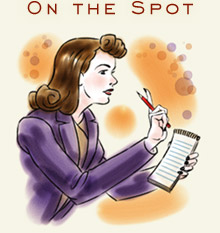Emdashes—Modern Times Between the Lines
The Basics:
About Emdashes | Email us
Ask the Librarians
Best of Emdashes: Hit Parade
A Web Comic: The Wavy Rule
Features & Columns:
Headline Shooter
On the Spot
Looked Into
Sempé Fi: Cover Art
New Museum 90s Panel: Roseanne Profile as Decade's Time Capsule
Filed under: On the Spot Tagged: Aaron Lake Smith, John Lahr, Jonathan Taylor, Marisa Meltzer, Mark Greif, n+1, New Museum, Roseanne Barr, Scott Hamrah

Jonathan Taylor writes:
Friday night's "The 90s vs. The 90s" panel discussion was occupied for a long time on what, either at the time or in retrospect, was "dark" or "light" about the decade, in the words of the moderator, n+1's Mark Greif.
The purest vein of nostalgia for the 90s was expressed by Aaron Lake Smith, 25. To him, the "public conversation was more interesting," because, in its weird way, it was addressing "the roots of capitalism"—why did Columbine happen; Ross Perot and the "giant sucking sound"; the Zapatistas—as opposed to the sham of, say, today's torture "debate." Scott Hamrah—once of Suck.com, a URL worth a thousand Q&A's—was quick to knock down young Aaron's rosy version, countering that the "conversation" was about O.J., not Subcomandante Marcos.
At a certain point, Marisa Meltzer suggested that the middle period of the 90s was a high point of sorts for the well-being of women, on an arc described between the Anita Hill testimony (1991) and the Lewinsky affair (1998, although Meltzer zeroed in on that year's premiere of "Sex and the City" as the decade's Altamont). As evidence of the good times, she cited the 1995 New Yorker profile of Roseanne Barr—"it's like something beamed to you from some era you never lived through and never will again" she said, or something close thereto.
Quite so. The article is likely overshadowed in many memories by the foofaraw over Roseanne's consulting-editorship of the 1996 "Women's Issue." But after all the talk about authenticity and shallowness, John Lahr's profile of Roseanne, who might be the closest thing to America's Bertolt Brecht, is a heartening reminder of the substance that can be created by spectacle.



